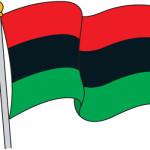The purpose of this article is to encourage colleges to integrate this cultural holiday into their student activity calendars, thus allowing all students to experience this unique celebration. The celebration works well in residence halls and with student organizations taking the lead.

Kwanzaa (KWAHN-zah) is a seven day African American cultural holiday, observed by peoples of Afrikan descent worldwide. It is a joyous celebration to reaffirm traditional Afrikan social values. It is therefore non-religious and non-heroic. The word “Kwanzaa” is derived from a Kiswahili phrase, “MATUNDA YA KWANZA” (mah-TOON-dah yah KWAHN-zah), meaning “first fruits.”
In Afrika, harvesting the first fruits or crops of the season was cause for celebration. The African American version of Kwanzaa was inspired by the traditional Afrikan ritual celebrating the harvest of the first fruits. An extra ‘a’ was added to the ending of the word Kwanzaa to distinguish the African American celebration.
Before proceeding with the principles of Kwanzaa, I should explain why Afrika is spelled with a K. Dr. Nantambu presents a concise analysis of the reasons for spelling Afrika with a K, based on the work of poet and writer Haki Madhubuti in Haki’s book From Plan to Planet (1973). Nantambu (2002) suggests four main reasons for the alternative spelling:

At the core of Kwanzaa are the seven principles on which it is founded. The practice of Kwanzaa according to Maulana Karenga (1999), its founder, is the fulfillment of the spirit of sharing, common good, freedom in collectivity and a strengthening of the human bonds between people. These principles reflect a shared destiny, shared rights, shared responsibility, and sharing as a value that defines us as humans.
These principles emphasize that the best goods in life, are those that we share with others. This includes freedom, justice, love, kinship, friendship, and communal bonds. Karenga maintains that human beings cannot enjoy any of these things unless they share it with others. Any end achieved cannot be beneficial unless it entails an increase in the common good. In that spirit the Kwanzaa celebration is incomplete unless it is shared with someone else.
THE SEVEN PRINCIPLES:
The seven principles remind us, that not only is human destiny a shared destiny, that cannot be achieved by anyone of us alone, but that we need to work together, in harmony with each other, to realize our human mission. Such harmonious existence implies the reaffirmation of equal status and inherent worthiness of every person.

Based on this foundational principle of equality of all individuals, it reaffirms the right to a quality education, the right to a safe space, access to sufficient economic resources to maintain a decent lifestyle, the right to self-determination, and the right to justice and freedom, as fundamental human rights, (Karenga, 1999). By the same token, it reminds us, of our responsibilities to work collectively in order to ensure that no one is deprived of these rights.
Kwanzaa was created by university professor and cultural scholar Dr. Maulana Karenga in 1966. His vision has resulted in one of the most important holidays observed by African Americans in the United States.
The annual seven day ritual begins the day after Christmas, December 26, and ends on New Year’s Day–January 1.
Kwanzaa is meant to foster a reunion of African American families and peoples, to recognize African American achievements, and to be a time for cultural renewal and re-dedication to strong family values.
For more information on how to celebrate Kwanzaa on your campus click here: Celebrate Kwanzaa on Your Campus – Here’s How